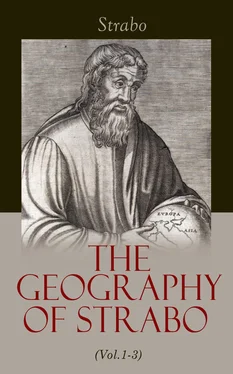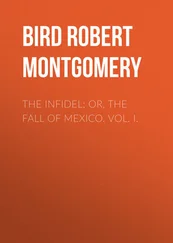Strabo - The Geography of Strabo (Vol.1-3)
Здесь есть возможность читать онлайн «Strabo - The Geography of Strabo (Vol.1-3)» — ознакомительный отрывок электронной книги совершенно бесплатно, а после прочтения отрывка купить полную версию. В некоторых случаях можно слушать аудио, скачать через торрент в формате fb2 и присутствует краткое содержание. Жанр: unrecognised, на английском языке. Описание произведения, (предисловие) а так же отзывы посетителей доступны на портале библиотеки ЛибКат.
- Название:The Geography of Strabo (Vol.1-3)
- Автор:
- Жанр:
- Год:неизвестен
- ISBN:нет данных
- Рейтинг книги:3 / 5. Голосов: 1
-
Избранное:Добавить в избранное
- Отзывы:
-
Ваша оценка:
- 60
- 1
- 2
- 3
- 4
- 5
The Geography of Strabo (Vol.1-3): краткое содержание, описание и аннотация
Предлагаем к чтению аннотацию, описание, краткое содержание или предисловие (зависит от того, что написал сам автор книги «The Geography of Strabo (Vol.1-3)»). Если вы не нашли необходимую информацию о книге — напишите в комментариях, мы постараемся отыскать её.
The Geography of Strabo (Vol.1-3) — читать онлайн ознакомительный отрывок
Ниже представлен текст книги, разбитый по страницам. Система сохранения места последней прочитанной страницы, позволяет с удобством читать онлайн бесплатно книгу «The Geography of Strabo (Vol.1-3)», без необходимости каждый раз заново искать на чём Вы остановились. Поставьте закладку, и сможете в любой момент перейти на страницу, на которой закончили чтение.
Интервал:
Закладка:
14. Beyond the Keltiberians to the south are the inhabitants of Orospeda and the country about the Xucar, 1244the Sidetani, 1245[who extend] as far as Carthage, 1246and the Bastetani and Oretani, [who extend] almost as far as Malaca. 1247
15. All the Iberians, so to speak, were peltastæ, furnished with light arms for the purposes of robbery, and, as we described the Lusitanians, using the javelin, the sling, and the sword. They have some cavalry interspersed amongst the foot-soldiers, the horses are trained to traverse the mountains, and to sink down on their knees at the word of command, in case of necessity. Iberia produces abundance of antelopes and wild horses. In many places the lakes are stocked. They have fowl, swans, and birds of similar kind, and vast numbers of bustards. Beavers are found in the rivers, but the castor does not possess the same virtue as that from the Euxine, 1248the drug from that place having peculiar properties of its own, as is the case in many other instances. Thus Posidonius tells us that the Cyprian copper alone produces the cadmian stone, copperas-water, and oxide of copper. He likewise informs us of the singular fact, that in Iberia the crows are not black; and that the horses of Keltiberia which are spotted, lose that colour when they pass into Ulterior Iberia. He compares them to the Parthian horses, for indeed they are superior to all other breeds, both in fleetness and their ease in speedy travelling.
16. Iberia produces a large quantity of roots used in dyeing. In olives, vines, figs, and every kind of similar fruit-trees, the Iberian coast next the Mediterranean abounds, they are likewise plentiful beyond. Of the coasts next the ocean, that towards the north is destitute of them, on account of the cold, and the remaining portion generally on account of the apathy of the men, and because they do not lead a civilized life, but pass their days in poverty, only acting on the animal [Pg 246]
[CAS. 164] impulse, and living most corruptly. They do not attend to ease or luxury, unless any one considers it can add to the happiness of their lives to wash themselves and their wives in stale urine kept in tanks, and to rinse their teeth with it, which they say is the custom both with the Cantabrians and their neighbours. 1249This practice, as well as that of sleeping on the ground, is common both among the Iberians and Kelts. Some say that the Gallicians are atheists, but that the Keltiberians, and their neighbours to the north, [sacrifice] to a nameless god, every full moon, at night, before their doors, the whole family passing the night in dancing and festival. The Vettones, the first time they came to a Roman camp, and saw certain of the officers walking up and down the roads for the mere pleasure of walking, supposed that they were mad, and offered to show them the way to their tents. For they thought, when not fighting, one should remain quietly seated at ease. 1250
17. What Artemidorus relates concerning the adornment of certain of their women, must likewise be attributed to their barbarous customs. He says that they wear iron collars having crows fixed to them which bend over the head, and fall forward considerably over the forehead. When they wish they draw their veil over these crows, so as to shade the whole face: this they consider an ornament. Others wear a tympanium 1251surrounding the occiput, and fitting tight to the head as far as the ears, turning over [and increasing] little by little in height and breadth. Others again make bald the front of the head, in order to display the forehead to greater advantage. Some twist their flowing hair round a small style, a foot high, and afterwards cover it with a black veil. Of singularities like these many have been observed and recorded as to all the Iberian nations in common, but particularly those towards the north, not only concerning their bravery, but likewise their cruelty and brutal madness. For in the war against the Cantabrians, mothers have slain their children sooner than suffer them to be captured; and a young boy, having obtained a sword, slew, at the command of his father, both his parents and brothers, who had been made prisoners and were bound, and a woman those who had been taken together with her. A man being invited by a party of drunken [soldiers] to their feast, threw himself into a fire. These feelings are common both to the Keltic, Thracian, and Scythian nations, as well as the valour not only of their men, but likewise of their women. These till the ground, 1252and after parturition, having put their husbands instead of themselves to bed, they wait upon them. Frequently in their employment they wash and swathe their infants, sitting down by some stream. Posidonius tells us that in Liguria, his host Charmoleon, a man who came from Marseilles, related to him, that having hired some men and women to dig his land, one of the women was seized with the pains of labour, and going to a little distance from where they were at work, she brought forth, and returned immediately to her work, for fear she might lose her pay. He observed that she was evidently working in considerable pain, but was not aware of the cause till towards evening, when he ascertained it, and sent her away, having given her her wages. She then carried her infant to a small spring, and having washed it, wrapped it up in as good swaddling clothes as she could get, and made the best of her way home.
18. Another practice, not restricted to the Iberians alone, is for two to mount on one horse, so that in the event of a conflict, one may be there to fight on foot. Neither are they the only sufferers in being tormented with vast swarms of mice, from which pestilential diseases have frequently ensued. This occurred to the Romans in Cantabria, so that they caused it to be proclaimed, that whoever would catch the mice should receive rewards according to the number taken, and [even with this] they were scarcely preserved, as they were suffering besides from want of corn and other necessaries, it being difficult to get supplies of corn from Aquitaine on account of [Pg 248]
CAS. 165 the rugged nature of the country. It is a proof of the ferocity of the Cantabrians, that a number of them having been taken prisoners and fixed to the cross, they chanted songs of triumph. Instances such as these are proofs of the ferocity of their manners. There are others which, although not showing them to be polished, are certainly not brutish. For example, amongst the Cantabrians, the men give dowries to their wives, and the daughters are left heirs, but they procure wives for their brothers. These things indicate a degree of power in the woman, although they are no proof of advanced civilization. 1253It is also a custom with the Iberians to furnish themselves with a poison, which kills without pain, and which they procure from a herb resembling parsley. This they hold in readiness in case of misfortune, and to devote themselves for those whose cause they have joined, thus dying for their sake. 1254
19. Some, as I have said, state that this country is separated into four divisions; others, into five. It is not easy to state any thing precisely on these points, both on account of the changes which the places have undergone, and by reason of their obscurity. In well-known and notable countries both the migrations are known, and the divisions of the land, and the changes of their names, and every thing else of the same kind. Such matters being the common topics with everybody, and especially with the Greeks, who are more talkative than any other people. But in barbarous and out-of-the-way countries, and such as are cut up into small divisions, and lie scattered, the remembrance of such occurrences is not nearly so certain, nor yet so full. If these countries are far removed from the Greeks [our] ignorance is increased. For although the Roman historians imitate the Greeks, they fall far short of them. What they relate is taken from the Greeks, very little being the result of their own ardour in acquiring information. So that whenever any thing has been omitted by the former there is not much supplied by the latter. Add to this, that the names most celebrated are generally Grecian. Formerly the name of Iberia was given to the whole country between the Rhone and the isthmus formed by the two Galatic gulfs; whereas now they make the Pyrenees its boundary, and call it indifferently Iberia or Hispania; others have restricted Iberia to the country on this side the Ebro. 1255Still earlier it bore the name of the Igletes, 1256who inhabited but a small district, according to Asclepiades the Myrlean. The Romans call the whole indifferently Iberia and Hispania, [Pg 250] [CAS. 166] but designate one portion of it Ulterior, and the other Citerior. However, at different periods they have divided it differently, according to its political aspect at various times.
Читать дальшеИнтервал:
Закладка:
Похожие книги на «The Geography of Strabo (Vol.1-3)»
Представляем Вашему вниманию похожие книги на «The Geography of Strabo (Vol.1-3)» списком для выбора. Мы отобрали схожую по названию и смыслу литературу в надежде предоставить читателям больше вариантов отыскать новые, интересные, ещё непрочитанные произведения.
Обсуждение, отзывы о книге «The Geography of Strabo (Vol.1-3)» и просто собственные мнения читателей. Оставьте ваши комментарии, напишите, что Вы думаете о произведении, его смысле или главных героях. Укажите что конкретно понравилось, а что нет, и почему Вы так считаете.












![Anne Blunt - A Pilgrimage to Nejd, the Cradle of the Arab Race. Vol. 2 [of 2]](/books/750183/anne-blunt-a-pilgrimage-to-nejd-the-cradle-of-the-thumb.webp)